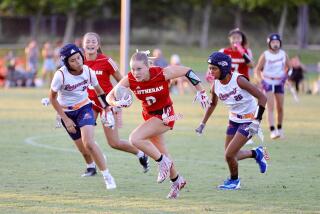Platform : What’s Good About America--and Southern California?
FIONA KNOX: Co-chair, Southern California Unit, Unitarian Universalist Service Committee, Manhattan Beach
My ancestors came from England, Scotland and Germany and were among the very first European settlers in America. In 1633 my great-great-great grandfather helped found Portland, Me. My mother was in the Mayflower Chapter of the Daughters of the American Revolution. And as an Anglo I’ve theoretically had every opportunity given to me. Although I worked my way through college, I always benefited from knowing the right people at the right time.
It was the social-justice movement of my church that made me politically aware years ago as a teen-ager. Through it I learned about inequality and racism. I was arrested 20 years ago in a demonstration seeking better treatment for farm workers. I was one of several who filed and won the first lawsuit against strip searches. I’ve been arrested twice for protesting U.S. policies in El Salvador. And now I’m working as a volunteer for health-care reform and jobs for everyone. With all I disagree with concerning U.S. policies, we still have the right to speak out and to change things. That’s the exciting part, the hopeful part.
I’m also proud of the way that over the centuries America has welcomed refugees and immigrants, and we should always continue to do so. I love the diversity here, the people bringing something from cultures from all over the world.
DAVE RAMBEAU: Director, United American Indian Involvement, Bell Gardens
From the perspective of being an American Indian--I’m a Paiute, born in California--America and Los Angeles have always been real progressive. Even though American Indians have suffered from European nations and peoples throughout our history, and there are prejudices here, overall the United States has a real good policy on human rights. When there are discrimination problems, we have places to go for recourse and a means to correct things.
American Indians are very forgiving. It’s our biggest problem as well as our biggest plus. The Sioux Indians call this “the wiping of tears”; it’s an understanding that time will heal and that somewhere down the line things will be forgiven and we will be able to keep moving forward. I believe that this is also the philosophy of the United States.
In California, people seem more open about themselves--their cultures, their sexual orientations, their ideas. They are more open to understanding the problems of different groups and then more willing to work on them. Maybe it’s because there are so many diverse groups here that we’ve just gotten practiced at it.
JORGE MORAN: Pastor, Los Angeles City Baptist Church, Boyle Heights
I didn’t want to come to this country from Mexico. My father practically forced me to come. I was 15 and I hated it here. At school I would write essays about all the things wrong with the United States, and you know what? My teachers actually encouraged me! I was amazed.
I was in high school and had a history teacher, Helen Rumell, who I still visit. She would tell us: “The United States did such-and-such wrong, but is that all we are? Aren’t there good things about us too?” One day I had to decide to be either a Mexican or an American, and I decided to be an American citizen.
Why do you suppose people from all over the world still come to the United States, sell everything they have, risk abuse and arrest, and abandon their loved ones to come? Because despite all the many things wrong here, like the decline in morals, this is still a land of freedom. It’s still a land of opportunity for those who are willing to work hard. It’s still a land of hope, and it’s still the best country in the world.
JUANITA TATE: Chair, Coalition of Neighborhood Developers, South-Central Los Angeles
I’ve worked for social change and economic justice most of my adult life, and what I appreciate most about the United States is that we have the freedom to express our concerns. It’s so important that people realize they can get involved and bring change. CND has done ground-breaking recently for affordable housing and a community printing shop and school, and we’ve organized a credit union and will begin more affordable housing soon.
CND is a multiethnic, multiracial coalition and its members include immigrants from all over the world. Many told me they were afraid to confront government here, or protest, because if they did that in their countries they could be killed.
AVANH SIVILAY: Clerk, L.A. County Harbor UCLA Medical Center, Carson
One good thing about California is that if you are willing to learn, you are given the opportunity for an education. In my country, Laos, you had to pay to go to school after the sixth grade. But here already the two oldest of my five daughters have graduated from UC Santa Cruz and the third is in junior college.
I came to the United States in 1980 and became a citizen in 1985. This month I was called to be a juror and although I was not on a final jury I was on a panel. Two times before I was called for jury duty and wrote back that I didn’t have the ability, but this time I felt I didn’t have that excuse anymore. At first I thought, “Oh gee, I’m still new to this country.” But they trusted me to be on the panel and I felt great. This is an example that once you become a citizen they treat you like everyone else.
More to Read
Get the L.A. Times Politics newsletter
Deeply reported insights into legislation, politics and policy from Sacramento, Washington and beyond. In your inbox three times per week.
You may occasionally receive promotional content from the Los Angeles Times.










